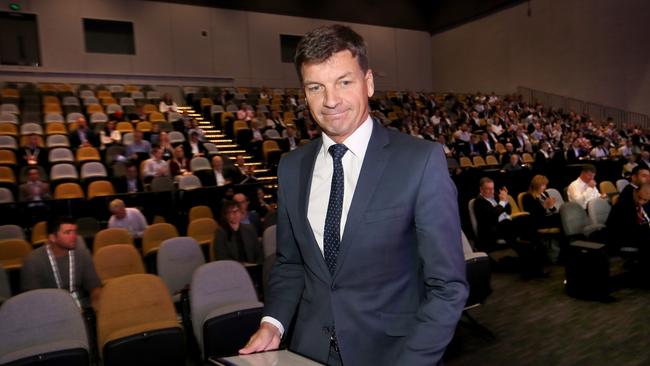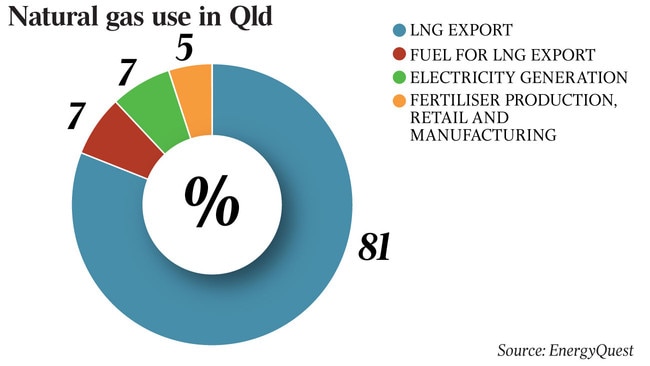Queensland’s gas royalty hike to hit industry hard
Australian manufacturers could be slugged by Queensland’s new royalty hit on the gas sector.

Australian manufacturers could be slugged by Queensland’s new royalty hit on the gas sector, with domestic producers expected to invoke a clause allowing the state’s higher taxes to be passed directly through to users.
Queensland joined Labor governments in Victoria and Western Australia in hitting up the resources sector to plug holes in the state budget, lifting petroleum royalties by 2.5 percentage points to 12.5 per cent effective from July 1.
Concerns have emerged that the move by Queensland Treasurer Jackie Trad will backfire by adding a new impost to manufacturers and heavy industry already struggling with high gas tariffs.
“The expectation is that it will apply to both domestic gas and export gas,” Queensland Resources Council boss Ian Macfarlane said. “Adding on the extra 25 per cent royalty tax will mean more expensive gas for export and more expensive gas for domestic users.”
It is unclear if the government will consider discounting royalties for producers that deliver gas to the local market.
Fertiliser and explosives maker Incitec Pivot struck a gas supply deal just last week with Australia Pacific LNG allowing it to keep its Gibson Island plant in Brisbane operational through 2022, while Senex on Tuesday agreed a domestic deal with glass-packaging manufacturer O-I Australia.
One gas industry source told The Australian the state government may have “shot itself in the foot” by effectively penalising the customers of gas who it has been trying to incentivise to sign domestic contracts.
“Every domestic gas contract has the ability to pass through changes in taxes and laws,” the gas executive said. “So all the government is doing is actually increasing the price of gas for domestic gas users.”
The country’s largest gas consumers — represented by the Energy Users Association of Australia — are alarmed by the government’s tax grab.
“I’m sure the suppliers will be looking to pass this through, but I’m sure the customer will be saying ‘we had a deal and you’re in the market to take risk, so you wear it’,” EUAA chief executive Andrew Richards told The Australian. “Of course the ability of an Incitec to pass on an additional cost to their customers is limited.”

Competition regulator Rod Sims and major commercial users including Orica, Incitec and Brickworks have sounded the alarm on soaring energy costs as they struggle to compete with international rivals which enjoy cheaper tariffs despite holding less natural resources.
One of the state’s most experienced gas executives, Richard Cottee, said the government had effectively hiked sovereign risk and eroded confidence in the industry just as the state was working to bridge a supply squeeze on the east coast.
“The problem I have with this is just as the gas market shortage was beginning to be recognised, the only government that has tried to do anything about increasing supply have now sent a bad message,” Mr Cottee said. “Investors will rationally use their choices partly based on signals by government. Whether domestic or export, money will drift away just when it is needed.”
The Queensland government said last night the gas industry had grown exponentially and reached economies of scale in production.
“The Palaszczuk government is encouraging the development of more gas reserves to increase supply to local consumers,” a spokesman for Ms Trad said. “We continue to consult with LNG stakeholders to ensure consumers get a fair deal on domestic prices, as we always have.”
Queensland took $187 million in oil and gas royalties in the 2017-18 financial year and is tipping petroleum royalties of $450m this year from exports worth $15.2 billion. The hike will bring in an extra $113m next year, to $577m, and an estimated $476m extra over the four years, taking the total to $2.5bn.
Federal Energy Minister Angus Taylor also took a swing at the Queensland government over its decision to hike gas royalties, describing the decision as “cash grab” that would hurt business and consumers.
“It’s not helpful,” he said, speaking at the Energy Week conference in Melbourne yesterday. “At the end of the day what we’ve seen in Queensland is a state government that is using the energy sector, electricity and gas, to try to make ends meet in a budget where they’re not making ends meet.”
Mr Taylor said Ms Trad was using high electricity prices and the gas royalty hike to prop up the state budget. “They took over $1.6bn into their budget from electricity consumers last year. And they are now doing the same with gas,” he said.
“Quiet Australians want to see jobs in industry, energy intensive industries, continue to prosper. And tearing money out of those industries to bolster a budget is not helpful, and is not in line with what we need to do to deliver successful prosperous industries with the competitive edge we’ve had for so many years. It’s a cash grab by the Queensland government.”
Additional reporting: Nick Evans


